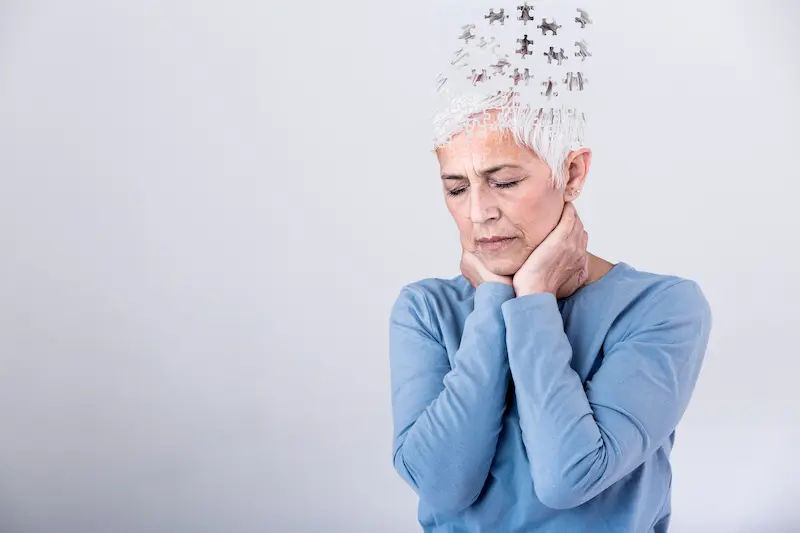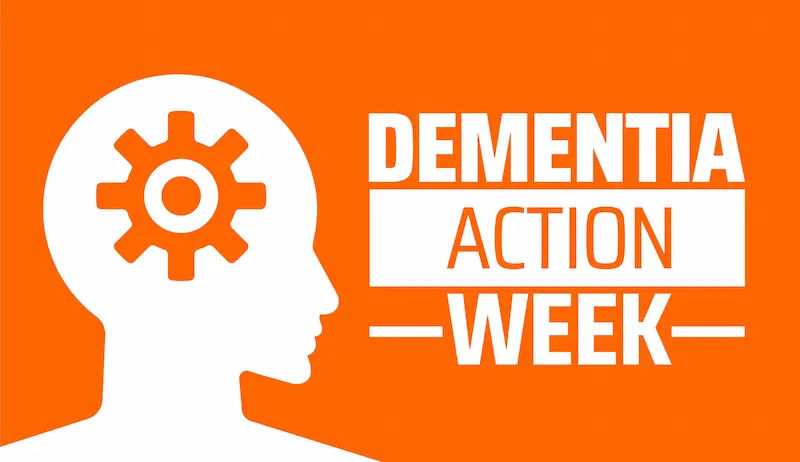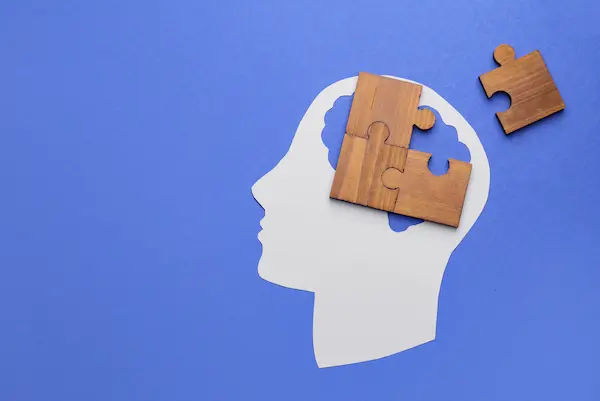Dementia: Symptoms, Types, and Treatment
Learn about dementia, its common symptoms, different types, and available treatment options to better manage the condition.


Introduction
Dementia is an umbrella term describing a range of symptoms associated with a decline in memory, reasoning, and other cognitive skills severe enough to reduce a person's ability to perform everyday activities. It is not a specific disease itself but rather a syndrome caused by various underlying brain illnesses. While often associated with memory loss, dementia encompasses much more, affecting communication, focus, and visual perception. It is a progressive condition, meaning symptoms gradually worsen over time. This can be a frightening prospect, both for the individual and their loved ones. However, understanding what dementia is, recognising its early signs, and knowing the available management strategies are the first crucial steps toward navigating this challenging journey. This article will guide you through the different types of dementia, their symptoms, causes, and the latest approaches to treatment and care, empowering you with knowledge and hope.
What is Dementia? More Than Just Memory Loss
At its core, dementia is caused by damage to brain cells. This damage interferes with the ability of brain cells to communicate with each other. When brain cells cannot communicate normally, thinking, behavior, and feelings can be affected. The brain has many distinct regions, each responsible for different functions (like memory, judgment, and movement). When cells in a particular region are damaged, that region cannot carry out its functions normally.
It's a common misconception that dementia is a normal part of aging. While age is the strongest known risk factor, it is not an inevitable consequence of growing older. Many people live into their 90s and beyond without any significant signs of cognitive decline. Furthermore, dementia is not just about "forgetting." It can lead to significant changes in personality, problem-solving abilities, and language skills, which can be deeply confusing and frustrating for the individual.
Dementia vs. Alzheimer's: Understanding the Difference
This is one of the most frequent points of confusion. Think of it this way:
Dementia is the syndrome; the overall term for the symptoms, like "heart disease" is a term for conditions affecting the heart.
Alzheimer's disease is the most common specific cause of dementia, accounting for 60-80% of cases. It is a specific disease characterised by the buildup of amyloid plaques and tau tangles in the brain.
Other diseases, like vascular dementia or Lewy body dementia, are different conditions that also cause dementia symptoms. Getting a specific diagnosis is crucial because the treatment and progression can differ.
Common Myths and Misconceptions About Dementia
Myth: Dementia is hereditary.
Fact: While family history increases risk, most cases are not directly inherited. Age, lifestyle, and environmental factors play a huge role.
Myth: Memory loss always means dementia.
Fact: Some memory trouble can be a normal part of aging or a sign of other treatable conditions like vitamin deficiencies or thyroid problems.
Myth: There is nothing you can do after a diagnosis.
Fact: While most dementias are progressive and incurable, treatments can slow the progression and manage symptoms, significantly improving quality of life for years.
Consult a Neurologist for the best advice
Recognising the Signs: Early and Later Symptoms
Symptoms of dementia can vary greatly from person to person, but they generally involve cognitive and psychological changes.
Early Warning Signs of Dementia
The early signs of dementia are often subtle and may be mistaken for simple forgetfulness. Key signs to watch for include:
- Memory loss that disrupts daily life: Forgetting recently learned information, important dates or events, asking for the same information repeatedly.
- Challenges in planning or solving problems: Difficulty following a familiar recipe, keeping track of monthly bills, or concentrating for long periods.
- Difficulty completing familiar tasks: Trouble driving to a familiar location, managing a budget, or remembering the rules of a favorite game.
- Confusion with time or place: Losing track of dates, seasons, and the passage of time. Forgetting where they are or how they got there.
- Trouble understanding visual images and spatial relationships: Difficulty reading, judging distance, and determining color or contrast, which can cause problems with driving.
How Symptoms Progress in Mid and Late Stages
As dementia progresses, symptoms become more pronounced and disabling. Memory worsens significantly, and individuals may need help with basic activities like dressing and bathing. They may fail to recognise close family members, undergo significant personality changes, and experience loss of mobility, leading to increased frailty. If you or a loved one are experiencing persistent memory loss or cognitive changes, it's essential to seek a professional opinion. Consulting a doctor online with Apollo24|7 can be a convenient first step to discuss concerns and determine if further evaluation is needed.
The Different Types of Dementia
Understanding the specific type of dementia is key to management.
Alzheimer's Disease: The Most Common Form
Alzheimer's is characterised by a gradual onset and steady progression of symptoms. The hallmark biological features are the accumulation of beta-amyloid plaques and tau tangles in the brain, which lead to the death of brain cells.
Vascular Dementia: Following a Stroke or TIA
Vascular dementia symptoms occur from impaired blood flow to the brain, often after a stroke or a series of "silent" strokes. Symptoms can appear suddenly and often include problems with reasoning, planning, judgment, and memory, which are more prominent than in other types.
Lewy Body Dementia and Parkinson's Disease Dementia
This type involves abnormal protein deposits (Lewy bodies) in the brain. Key symptoms include visual hallucinations, sleep disturbances, and motor symptoms similar to Parkinson's disease, such as rigidity and tremors. Memory may be less affected initially.
Frontotemporal Dementia (FTD): Affecting Behaviour and Language
This group of diseases affects the frontal and temporal lobes of the brain, which are associated with personality, behavior, and language. Frontotemporal dementia behaviour changes are often the first signs, including impulsivity, social inappropriate-ness, apathy, and a decline in language skills.
How is Dementia Diagnosed? The Path to Clarity
There is no single test for dementia. Diagnosis involves a comprehensive assessment to rule out other conditions that can mimic dementia, such as vitamin B12 deficiency, thyroid issues, or depression.
- Medical History and Physical Exam: A doctor will review symptoms, family history, and medications.
- Cognitive and Neuropsychological Tests: These assess memory, problem-solving, language, and math skills. The Mini-Mental State Exam (MMSE) is a common screening tool.
- Neurological Exam: Checks balance, sensory response, reflexes, and other functions.
- Brain Scans: MRI and CT scans can identify strokes, tumors, or other structural changes. They can also show patterns of brain shrinkage.
- Lab Tests: Blood tests can rule out other causes of symptoms. Apollo24|7 offers convenient home collection for tests like thyroid function or vitamin panels, making this step easier for patients and families.
Get Your Health Assessed
Treatment and Management: Improving Quality of Life
While there is no cure for most types of dementia, treatments can help manage symptoms.
Medications for Managing Dementia Symptoms
Two main classes of drugs are used:
1. Cholinesterase inhibitors (Donepezil, Rivastigmine, Galantamine): These work by boosting levels of a chemical messenger involved in memory and judgment. They are primarily used for Alzheimer's but can help with other dementias.
2. Memantine: This drug regulates glutamate, another chemical messenger, and is used to treat moderate to severe Alzheimer's.
Non-Drug Therapies
These are vital for maintaining quality of life:
- Cognitive Stimulation Therapy: Engaging in activities and exercises designed to improve memory and problem-solving skills.
- Reminiscence Therapy: Discussing past experiences and events, often using photos or familiar objects.
- Music and Art Therapy: Can reduce agitation and improve mood, even in later stages.
Prevention Strategies: Can Dementia Be Prevented?
While not guaranteed, a healthy lifestyle can significantly reduce your risk.
- Heart Health = Brain Health: Conditions that affect your heart also affect your brain. Manage blood pressure, cholesterol, and blood sugar.
- Stay Physically Active: Regular exercise increases blood flow to the brain.
- Eat a Balanced Diet: Diets like the Mediterranean diet, rich in fruits, vegetables, whole grains, and healthy fats, are linked to better cognitive health.
- Stay Socially and Mentally Engaged: Continue learning, reading, and socialising to build your brain's resilience.
Caring for a Loved One with Dementia: A Guide for Caregivers
Caregiving is challenging but can also be rewarding. The key is to focus on connection and support rather than correction.
- Communication: Use simple words and sentences. Speak slowly and reassuringly. Maintain eye contact and use nonverbal cues.
- Create a Routine: A predictable schedule helps reduce anxiety.
- Manage Frustration: If a task is causing frustration, break it down into steps or take a break. Redirect attention to a different activity.
- Seek Support: Caregiver burnout is real. Join a support group, ask family for help, and utilize respite care services. Your well-being is essential.
Conclusion
Understanding dementia is the first and most powerful step in confronting it. It moves the conversation from one of fear and uncertainty to one of knowledge, preparedness, and compassion. Recognising the early signs of dementia allows for earlier intervention, which can make a significant difference in managing the condition's progression. While the journey is undeniably difficult for both the individual and their family, it's important to remember that you are not alone. A wealth of resources, support groups, and medical professionals are available to help. By focusing on creating a safe environment, utilising available treatments, and prioritising the emotional well-being of everyone involved, it is possible to navigate the challenges of dementia while preserving dignity and quality of life. If you have concerns about your own or a loved one's cognitive health, take that brave first step and consult a doctor online with Apollo24|7 to discuss your observations and get guidance on the next steps.
Consult a Neurologist for the best advice
Consult a Neurologist for the best advice
Dr. Meghraj Singh Patel
Neurologist
11 Years • MBBS, MD, DM (NEUROLOGY)
Bhopal
Apollo Sage Hospitals, Bhopal

Dr. Rajendra Prasad
Spine Surgeon
36 Years • MBBS. FRCS (Glas) U.K FRCS (Neurosurgery) Intercollegiate Specialty Board in Neurosurgery (U.K). Fellowship in Spine Surgery, Stanmore, London U.K. Specialist Registration in Neurosurgery with General Medical Council. U.K
Delhi
Apollo Hospitals Indraprastha, Delhi

Dr. Rajendran S
Neurologist
30 Years • MD, DM (Neuro), MRCP (Irel&), MSc (Neuro)
Chennai
Apollo Hospitals Greams Road, Chennai
(150+ Patients)

Dr. Boby Varkey Maramattom
Neurologist
22 Years • MD, DM (neurology), EDSI, FRCP, FICCN
Angamaly
Apollo Hospitals Karukutty, Angamaly
(25+ Patients)

Dr. Dipti Ranjan Tripathy
Neurologist
15 Years • MBBS, MD (GENERAL MEDICINE ),DM (NEUROLOGY)
Rourkela
Apollo Hospitals, Rourkela, Rourkela
(25+ Patients)
Consult a Neurologist for the best advice
Dr. Meghraj Singh Patel
Neurologist
11 Years • MBBS, MD, DM (NEUROLOGY)
Bhopal
Apollo Sage Hospitals, Bhopal

Dr. Rajendra Prasad
Spine Surgeon
36 Years • MBBS. FRCS (Glas) U.K FRCS (Neurosurgery) Intercollegiate Specialty Board in Neurosurgery (U.K). Fellowship in Spine Surgery, Stanmore, London U.K. Specialist Registration in Neurosurgery with General Medical Council. U.K
Delhi
Apollo Hospitals Indraprastha, Delhi

Dr. Rajendran S
Neurologist
30 Years • MD, DM (Neuro), MRCP (Irel&), MSc (Neuro)
Chennai
Apollo Hospitals Greams Road, Chennai
(150+ Patients)

Dr. Boby Varkey Maramattom
Neurologist
22 Years • MD, DM (neurology), EDSI, FRCP, FICCN
Angamaly
Apollo Hospitals Karukutty, Angamaly
(25+ Patients)

Dr. Dipti Ranjan Tripathy
Neurologist
15 Years • MBBS, MD (GENERAL MEDICINE ),DM (NEUROLOGY)
Rourkela
Apollo Hospitals, Rourkela, Rourkela
(25+ Patients)
More articles from Dementia
Frequently Asked Questions
What is the life expectancy for a person with dementia?
Life expectancy varies widely depending on the type of dementia, age at diagnosis, and overall health. On average, a person may live 4 to 8 years after diagnosis, but some can live as long as 20 years.
Can dementia be reversed?
Most forms of dementia, like Alzheimer's, are progressive and cannot be reversed. However, if the symptoms of cognitive decline are caused by a treatable condition like a vitamin deficiency, thyroid issue, or medication side effect, they can often be reversed with proper treatment.
How do I talk to a parent who is showing signs of dementia?
Choose a quiet time and place. Express your concern with love and support, using 'I' statements ('I've noticed you've been having trouble with X lately, and I'm worried'). Focus on getting a check-up for overall health rather than immediately suggesting dementia. Offer to go to the doctor with them.
Are there any new treatments for dementia?
Research is ongoing. Recent years have seen the development of new disease-modifying therapies for Alzheimer's that target the underlying amyloid plaques. These are for early-stage Alzheimer's and require extensive testing (like PET scans) to determine eligibility. Always discuss the latest options with a neurologist.
What is the difference between mild cognitive impairment (MCI) and dementia?
MCI is a noticeable decline in cognitive function that is worse than normal aging but not severe enough to interfere significantly with daily life. Not everyone with MCI develops dementia; some remain stable or even improve. Dementia is a more severe decline that impairs daily functioning.






